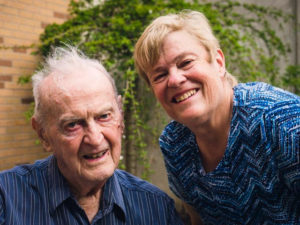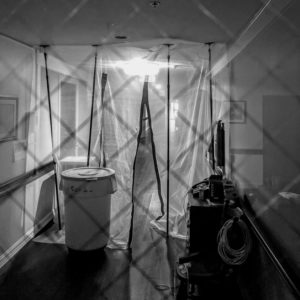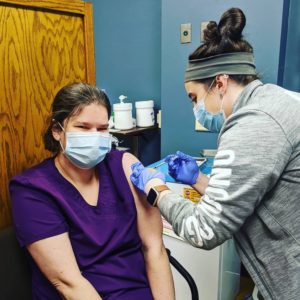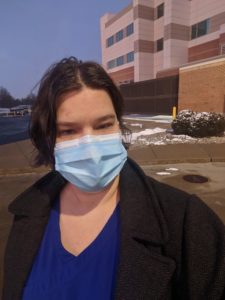
Introducing Mom…
Today, my mom called me to let me know that she had received her first shot of Pfizer’s vaccine. She’s a pretty healthy not-too-much-over-70 woman who assured me that the biggest symptom she has had so far was a feeling of amazement and dawning relief.
We are all carrying around a lot of stress and anxiety — for so many reasons — and I think it’s important that we continue to acknowledge that. It’s okay to feel anxious! It’s also okay to be tired of living under a burden of constant vigilance, because that is emotionally and physically exhausting, and we have been living under COVID vigilance since roughly March of last year to varying degrees.
Take care of yourself, if you can, this coming weekend. Go outside if that’s feasible for you, and take some time to breathe fresh air (if you are quarantining or isolating, then take appropriate precautions to avoid others breathing your freshly-exhaled air, but get some fresh of your own). Write a letter to yourself or so meone you care about (It’s okay! Wash or sanitize your hands after handling your mail because that’s good practice any time you handle something a zillion people and machines have been touching, but the risk of getting COVID from your friend’s letter is minimal, if any). Make some tea, if you enjoy tea. Take a long bath. Get dressed in nice clothing if you have been living in sweats. Exercise if you have not been (exercise outside if you can): exercise triggers your body’s natural antidepressants.
None of this is going to make it okay that we’re living lives of vigilance and separation. But the really amazing thing about human beings is how good we are – when we let ourselves – at finding creative ways to solve our problems. Give yourself permission – because I am giving you permission – to be your most amazing self this weekend. I’m interested to know what that looks like, if you decide you want to share.
Mom had a vaccine question for today’s diary:
What happens if I don’t get my second dose right at 21 days (or 28 days)? What if my second shot is late?
Short answer:
You’re still considered to be fully vaccinated, even if your second shot is waaaay after your first, although we don’t have data to give you a definite answer beyond 6 weeks yet. That’s consistent with our recommendations for all the routine vaccinations you’re likely to get — we don’t generally restart shot series.
Long answer:
Most vaccines – regardless of the trick they use to do it – work by invoking your immune system’s short-term defenses and long-term memory cells. For vaccines that are given in a series (like your childhood shots are), each shot builds on the memories of the one before it, reinforcing the protective responses of your immune system to create long-lasting defenses.
Let’s look at tetanus as a great example. The idea behind tetanus vaccination is to protect you from Clostridium tetani infection, which causes tetanus (cheerfully known as lockjaw to some folks). C. tetani lives in dirt and makes a toxin that causes serious muscle spasms, and getting tetanus naturally does not protect you from future infection (yikes!). Fortunately, we have an extremely effective set of vaccines to help your body protect itself against tetanus. We measure that protection by checking levels of tetanus antitoxin.
The first dose of a tetanus vaccine creates almost no protection — but it primes your immune syste for the next; after the third dose nearly every vaccine recipient has high enough levels of tetanus antitoxin to safely step on a dirty nail without getting lockjaw (I don’t recommend stepping on nails regardless). That protection lasts for about 3-5 years, so we give a booster shot to kids who are entering kindergarten, and another one in the early teenage years. At that point you may be protected to some degree for 20-30 years because your immune system remembers – but we still currently recommend a booster every 10 years to keep the memories fresh, and if you happen to encounter a dirty nail we’re going to give you a booster dose to make extra sure you stay safe.
If you happen to miss out on one of those childhood doses, we don’t make you restart the series – because we’re counting on the long-term memory cells (remember the memory B and memory T cells? We talked about those a couple of weeks ago) to pick up where they left off with the next vaccine in the series. For almost every vaccine on the market (exceptions: certain cholera and typhoid vaccines), that remains true; we recommend a minimum time to wait between vaccine injections in order to let your body finish round one of recognizing and remembering so it can launch its best response to round two, but there is no maximum time.
The data we have at this point is only good for a delay of about six weeks between vaccines, and only on the Pfizer vaccine. Because Moderna’s vaccine is so similar, we are making an educated choice to treat it similarly, and as we continue to vaccinate more people – and make difficult decisions about how to distribute a limited vaccine supply – we may learn more (scientists love data! Even if it’s not in a controlled experiment) and be able to expand that information.
For now, if you have gotten two doses of the Pfizer or Moderna vaccines – spaced at least 21 (Pfizer) or 28 (Moderna) days apart (the CDC says you can have a grace period of up to 4 days early), then you are considered to be fully vaccinated.
And thanks for asking the question, Mom!
- References for today:
Coronavirus disease 2019 (COVID-19): Infection control in health care and home settingsPrevention of Pertussis, Tetanus, and Diphtheria with Vaccines …
Interim Clinical Considerations for Use of Pfizer-BioNTech COVID-19 Vaccine
mRNA-1273 vaccine (Moderna) against COVID-19 background document: draft prepared by the Strategic Advisory Group of Experts (SAGE) on Immunization Working Group on COVID-19 vaccines, 19 January 2021



